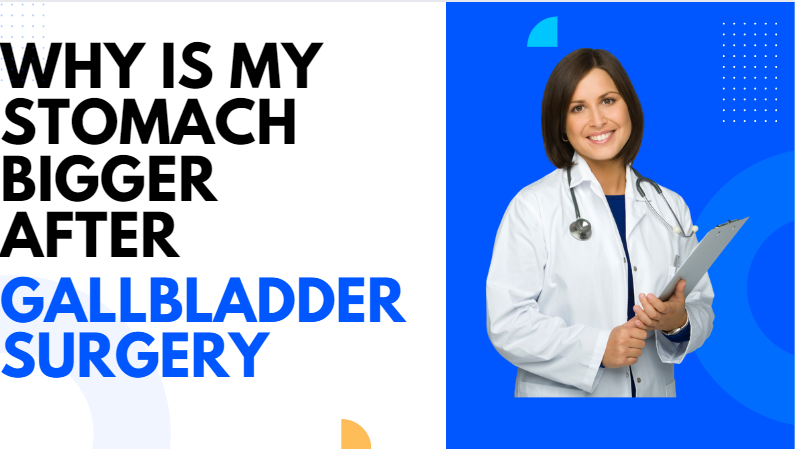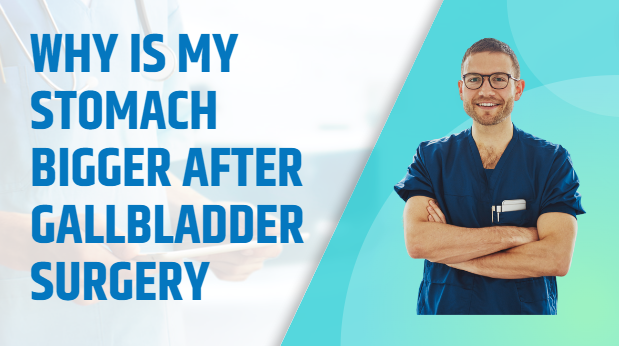Why is my Stomach Bigger after Gallbladder Surgery
One of the most popular post-operative questions is, “Why is my stomach bigger after gallbladder surgery?” In this article, we will provide clear solutions to this question.
Even though the surgical removal of the gallbladder (cholecystectomy) is regarded as a generally safe operation, however, it is very unlikely that complications will occur. This fluid might be necessary to flush out.
Bloating is a prevalent and undesirable side effect of gallbladder surgery. This is a result of the body’s fluid retention when the gallbladder isn’t fully functional. A bile leak can lead to vomiting, an enlarged abdomen, stomach upset and headache.

Reasons Why Your Stomach is Bigger after Gallbladder Surgery
It may be hard for your body to absorb fats after surgically removing your gallbladder. Most of the time, over-the-counter medications can alleviate discomfort and bloating.
Here’s why your stomach gets bigger after gallbladder surgery:
Infection
After surgical removal of the gallbladder, many people develop an intestinal wound or infection.
Thus, they may experience severe pain, swelling, or bloating. There may also be bodily fluid seeping from the wound. This is a sign of possible infection.
If you notice these symptoms, seek medical treatment immediately because you may be administered antibiotics for a brief period.
Bleeding
Bleeding may occur after surgery, although this is very uncommon. Whenever this happens, you might need another surgical operation to treat this.
Bile Leakage
During gallbladder removal surgery, special clips are deployed to seal the tube that feeds the gallbladder to the main biliary tract.
However, this can cause bile fluid to seep into the stomach after gallbladder removal surgery. Symptoms of bile leaking include stomachache, vomiting, and bloated stomach.
How Can You Care for Yourself at Home?
- After gallbladder removal surgery, you may experience tiredness and general lethargy. Also, there may be cases of bloated stomach.
- The reason for this is linked to the air the health specialist injected into your stomach to aid them in viewing your organs precisely.
- For a while, you may feel bloated and uncomfortable or burp repeatedly. Lots of people experience watery stools. This is only temporary and often goes away within a month.
- The kind of surgery you have had (laparoscopic or open) will have an impact on the post-operative process and subsequent recovery.
- Following a laparoscopic procedure, most people can get back to their normal schedule and work-life seven to fourteen days. Keep in mind that the type of work you do may elongate or shorten the process of recovery.
- For open surgery, it may take as long as 1 to 2 months to resume your normal schedule.
Activity
- When feeling tired, rest adequately. You will get to hasten your recovery with proper sleep.
- A short walk will help. Begin with a couple more extra steps than the ones you took the day before. Walking will lower your risk of catching pneumonia and deep vein thrombosis.
- Stay away from strenuous tasks for a month until your doctor gives you the go-ahead.
- Confirm with your health specialist if you can drive or engage in sexual activity.
Read: Good Excuses to Leave Work Early
Diet
- Begin by consuming only a small quantity of food if you wish. Desist from eating food rich in fat like cheese and unhealthy junk. This can cause bloating and a runny stomach.
- Take as much water as possible (except as advised against by your doctor)
- After your surgery, you will experience irregular bowel movements. This is normal.
- Try as much as possible to prevent constipation and difficult stooling. Take fiber supplements every day if possible. Inquire from your doctor if you can use a mild laxative if you have difficulty stooling.
How to Take Medications
- Most people are always nervous about staying on a course of medication after gallbladder surgery. Here’s what to expect if you wish to have this medical operation:
- Even when you recover, it is important to follow the course of medication as prescribed.
- Ensure you consult your doctor about your medications following the surgery.
- Do not stop your drug dosage without your doctor’s recommendation or advice.
- Ensure your family member is conversant with your drug prescription and the OTC medications you are taking.
How Do You Get Rid of Belly Fat After Gallbladder Surgery?
- Stay away from any fried or oily foods.
- Avoid eating hot or gaseous meals.
- Reduce your caffeine consumption.
- Eat more regular, smaller meals and nutritious snacks.
- Raise your fiber intake gradually.
Related:
Best Medical Schools in the US (Comprehensive Report – 2025)
